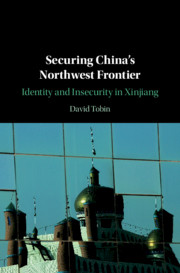Book contents
- Securing China’s Northwest Frontier
- Securing China’s Northwest Frontier
- Copyright page
- Dedication
- Contents
- Figures
- Abbreviations
- Introduction
- 1 Securing China on the Multi-Ethnic Frontier
- 2 Mass Education as an Identity-Security Practice
- 3 ‘East Turkestan’ in China’s Identity and Security Narratives
- 4 Identity and Insecurity after ‘7-5’
- 5 Performing Inclusion of the Uyghur Other
- 6 Han and Uyghur Narratives on Ethnic and National Identity
- 7 Han and Uyghur Narratives on Identity and Insecurity
- Conclusion
- Book part
- Bibliography
- Index
5 - Performing Inclusion of the Uyghur Other
Published online by Cambridge University Press: 18 September 2020
- Securing China’s Northwest Frontier
- Securing China’s Northwest Frontier
- Copyright page
- Dedication
- Contents
- Figures
- Abbreviations
- Introduction
- 1 Securing China on the Multi-Ethnic Frontier
- 2 Mass Education as an Identity-Security Practice
- 3 ‘East Turkestan’ in China’s Identity and Security Narratives
- 4 Identity and Insecurity after ‘7-5’
- 5 Performing Inclusion of the Uyghur Other
- 6 Han and Uyghur Narratives on Ethnic and National Identity
- 7 Han and Uyghur Narratives on Identity and Insecurity
- Conclusion
- Book part
- Bibliography
- Index
Summary
Chapter 5 analyses the inclusion of Uyghurs in public performances of ethnic unity (minzu tuanjie 民族团结) and celebrations of traditional ethnic festivals of Han (Zhongqiu jie 中秋节) and Uyghurs (Roza Heyti روزاھېيىت). The first section analyses inclusion of Uyghurs through performances of minzu tuanjie in songs and political slogans that saturated Xinjiang’s public discourse following the 2009 violence. Ethnic inclusion in these texts is mutually constituted against existential threats of Uyghur identities to China. The second section analyses the hierarchical relationship between nation and ethnicity and between Han and Uyghurs in representations of different traditional festivals. Minority festivals are officially framed as private and ethnic while majority Han festivals are celebrated as nationally significant events for all minzu. Minzu tuanjie is ethnocentric and hierarchical because it offers inclusion contingent upon identification with Hanzu as superior and Uyghur identity as marginal. This chapter shows how the inclusion offered by nation-building in Xinjiang produces and reproduces Uyghur marginality and exclusion in contemporary China. Inclusion of Uyghurs in Zhonghua Minzu demands identification with hierarchical boundaries between Hanzu and shaoshu minzu, with the Han nucleus guiding the direction of history towards 'fusion' and disappearance of Uyghur identity.
Keywords
- Type
- Chapter
- Information
- Securing China's Northwest FrontierIdentity and Insecurity in Xinjiang, pp. 139 - 165Publisher: Cambridge University PressPrint publication year: 2020



